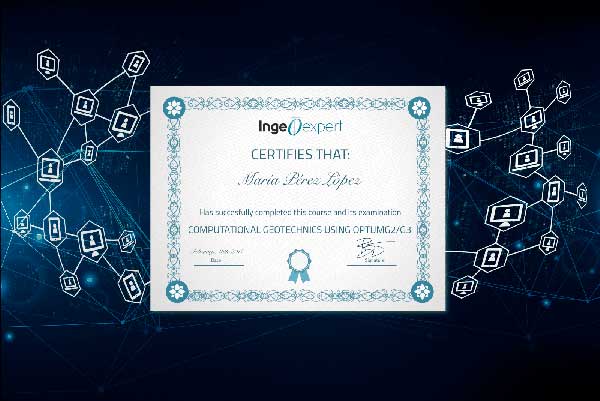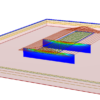Principles of corrosion and oxidation
Online course |
|
50 hours / 6 weeks |
|
To be determined |
Introduction
Corrosion is the deterioration of materials by interaction with their environment. Corrosion is responsible for the failure of many systems and structures. The indirect costs of corrosion are many and varied and the effects of these on the safe, reliable and efficient operation of equipment or structures are often more serious than the simple loss of a mass of metal.
Objectives
The main purpose of this course is discussion of technologically important material-environment combinations. This course provides a basic but thorough review of causes of corrosion and the methods by which it can be identified, tested, monitored, and controlled. This course enables students to apply scientific and engineering concepts in understanding of the basic science of corrosion, predict the corrosion behavior in practice, select the appropriate materials for an application, analyze the failures due to corrosion, and select the appropriate prevention and protection techniques.
Module I: (10 hours)
- – Introduction to Corrosion
- – Types of Corrosion
- – Basics of Thermodynamics
- – Thermodynamics of Corrosion
Module II: (10 hours)
- – Kinetics of Corrosion
- – Theory of Passivity
- – Webinar 1 (1 hour Q/A session for Modules I and II)
- – Assignment 1
- – Exam 1
Module III: (5 hours)
- – Localized Corrosion
- – Environmental Aspects of Corrosion
- – Mechanical Aspects of Corrosion
Module IV: (10 hours)
- – Corrosion Testing
- – Webinar 2 (1 hour Q/A session for Modules III and IV)
- – Assignment 2
- – Exam 2
Module V: (5 hours)
- – High Temperate Corrosion (Oxidation)
- – Corrosion of Steel in Concrete
Module VI: (10 hours)
- – Materials Selection
- – Corrosion Protection
- – Webinar 3 (1 hour Q/A session for Modules V and VI)
- – Assignment 3
Grading Method for Certificate
- – 40% Assignments and Exams
- – 60% Final Exam
Amir Pursaee
Amir Poursaee is an associate professor at the Glenn Department of Civil Engineering and Materials Science & Engineering at Clemson University. He received his Ph.D. in Mechanical Engineering from the University of Waterloo, Canada. After graduating in 2007, he joined Purdue University as Research Assistant Professor and then joined Clemson University in 2011. Dr. Poursaees’ primary research areas include corrosion and electrochemical behavior of materials, materials science, and construction materials.
He is a recipient of the prestigious Humboldt fellowship for experienced researchers. The Humboldt Foundation awards these research fellowships to experienced researchers with excellent qualifications in their research profile. This award supported Poursaee’s collaboration with Max-Planck-Institut für Eisenforschung in Germany. He has co-authored over 70 peer-reviewed conference or journal publications, four book chapters, and edited two books in the field of corrosion.
The course is delivered online through our easy-to-use Virtual Campus platform. For this course, a variety of content is provided including:
– eLearning materials
– Videos
– Interactive multimedia content
– Live webinar classes
– Texts and technical articles
– Case studies
– Assignments and evaluation exercises
Students can download the materials and work through the course at their own pace.
We regularly update this course to ensure the latest news and state-of-the-art developments are covered, and your knowledge of the subject is current.
Live webinars form part of our course delivery. These allow students and tutors to go through the course materials, exchange ideas and knowledge, and solve problems together in a virtual classroom setting. Students can also make use of the platform’s forum, a meeting point to interact with tutors and other students.
The tutoring system is managed by email. Students can email the tutor with any questions about the course and the tutor will be happy to help.
The course is targeted both for people entering the field of corrosion, professionals looking for a refresher, and upper-level undergraduate- and graduate-level students. Participants with engineering, physics and chemistry backgrounds can register for this course.
Useful resources:
Books:
- – Principles and Prevention of Corrosion, By: D. Jones
- – Corrosion and Corrosion Control, By: H. H. Uhlig
- – Corrosion Engineering, By: M. G. Fontana
Journals:
- – Corrosion Science
- – Corrosion
- – Anti-Corrosion Methods and Materials
- – Materials and Corrosion
Once a student finishes the course and successfully completes the assignments and evaluation tests, they are sent an accreditation certificate. The certificate is issued by Ingeoexpert to verify that the student has passed the course. It is a digital certificate that is unique and tamper-proof – it is protected by Blockchain technology. This means it is possible for anyone to check that it is an authentic, original document.
You will be able to download the certificate in an electronic format from the Virtual Campus platform. The certificate can be forwarded by email, shared on social networks, and embedded on websites. To see an example, click here.
This course will help student secure jobs as a corrosion engineer. A corrosion engineer can conduct research and develop methods to lower the environmental impact to prevent a collapse or failure of infrastructure facilities such as roadways, bridges, power plants, windmills, manufacturing plants and pipelines. A corrosion engineer also design new materials and structures that will address emerging needs in a variety of industries including. Corrosion engineers can be employed in sectors such as defense, aerospace, utilities, natural gas, chemical plants, refineries, and oil & gas extraction. Students can also benefit from Continuous Professional Develop (CPD) by attending this course.
Introduction
Corrosion is the deterioration of materials by interaction with their environment. Corrosion is responsible for the failure of many systems and structures. The indirect costs of corrosion are many and varied and the effects of these on the safe, reliable and efficient operation of equipment or structures are often more serious than the simple loss of a mass of metal.
Objectives
The main purpose of this course is discussion of technologically important material-environment combinations. This course provides a basic but thorough review of causes of corrosion and the methods by which it can be identified, tested, monitored, and controlled. This course enables students to apply scientific and engineering concepts in understanding of the basic science of corrosion, predict the corrosion behavior in practice, select the appropriate materials for an application, analyze the failures due to corrosion, and select the appropriate prevention and protection techniques.
Module I: (10 hours)
- – Introduction to Corrosion
- – Types of Corrosion
- – Basics of Thermodynamics
- – Thermodynamics of Corrosion
Module II: (10 hours)
- – Kinetics of Corrosion
- – Theory of Passivity
- – Webinar 1 (1 hour Q/A session for Modules I and II)
- – Assignment 1
- – Exam 1
Module III: (5 hours)
- – Localized Corrosion
- – Environmental Aspects of Corrosion
- – Mechanical Aspects of Corrosion
Module IV: (10 hours)
- – Corrosion Testing
- – Webinar 2 (1 hour Q/A session for Modules III and IV)
- – Assignment 2
- – Exam 2
Module V: (5 hours)
- – High Temperate Corrosion (Oxidation)
- – Corrosion of Steel in Concrete
Module VI: (10 hours)
- – Materials Selection
- – Corrosion Protection
- – Webinar 3 (1 hour Q/A session for Modules V and VI)
- – Assignment 3
Grading Method for Certificate
- – 40% Assignments and Exams
- – 60% Final Exam
Amir Pursaee
Amir Poursaee is an associate professor at the Glenn Department of Civil Engineering and Materials Science & Engineering at Clemson University. He received his Ph.D. in Mechanical Engineering from the University of Waterloo, Canada. After graduating in 2007, he joined Purdue University as Research Assistant Professor and then joined Clemson University in 2011. Dr. Poursaees’ primary research areas include corrosion and electrochemical behavior of materials, materials science, and construction materials.
He is a recipient of the prestigious Humboldt fellowship for experienced researchers. The Humboldt Foundation awards these research fellowships to experienced researchers with excellent qualifications in their research profile. This award supported Poursaee’s collaboration with Max-Planck-Institut für Eisenforschung in Germany. He has co-authored over 70 peer-reviewed conference or journal publications, four book chapters, and edited two books in the field of corrosion.
The course is delivered online through our easy-to-use Virtual Campus platform. For this course, a variety of content is provided including:
– eLearning materials
– Videos
– Interactive multimedia content
– Live webinar classes
– Texts and technical articles
– Case studies
– Assignments and evaluation exercises
Students can download the materials and work through the course at their own pace.
We regularly update this course to ensure the latest news and state-of-the-art developments are covered, and your knowledge of the subject is current.
Live webinars form part of our course delivery. These allow students and tutors to go through the course materials, exchange ideas and knowledge, and solve problems together in a virtual classroom setting. Students can also make use of the platform’s forum, a meeting point to interact with tutors and other students.
The tutoring system is managed by email. Students can email the tutor with any questions about the course and the tutor will be happy to help.
The course is targeted both for people entering the field of corrosion, professionals looking for a refresher, and upper-level undergraduate- and graduate-level students. Participants with engineering, physics and chemistry backgrounds can register for this course.
Useful resources:
Books:
- – Principles and Prevention of Corrosion, By: D. Jones
- – Corrosion and Corrosion Control, By: H. H. Uhlig
- – Corrosion Engineering, By: M. G. Fontana
Journals:
- – Corrosion Science
- – Corrosion
- – Anti-Corrosion Methods and Materials
- – Materials and Corrosion
Once a student finishes the course and successfully completes the assignments and evaluation tests, they are sent an accreditation certificate. The certificate is issued by Ingeoexpert to verify that the student has passed the course. It is a digital certificate that is unique and tamper-proof – it is protected by Blockchain technology. This means it is possible for anyone to check that it is an authentic, original document.
You will be able to download the certificate in an electronic format from the Virtual Campus platform. The certificate can be forwarded by email, shared on social networks, and embedded on websites. To see an example, click here.
This course will help student secure jobs as a corrosion engineer. A corrosion engineer can conduct research and develop methods to lower the environmental impact to prevent a collapse or failure of infrastructure facilities such as roadways, bridges, power plants, windmills, manufacturing plants and pipelines. A corrosion engineer also design new materials and structures that will address emerging needs in a variety of industries including. Corrosion engineers can be employed in sectors such as defense, aerospace, utilities, natural gas, chemical plants, refineries, and oil & gas extraction. Students can also benefit from Continuous Professional Develop (CPD) by attending this course.
More info
Finish this course and get a certificate based on Blockchain
Principles of corrosion and oxidation

Blockchain technology makes the certificate incorruptible, enabling companies to verifiy its autenticity.





Reviews
There are no reviews yet.